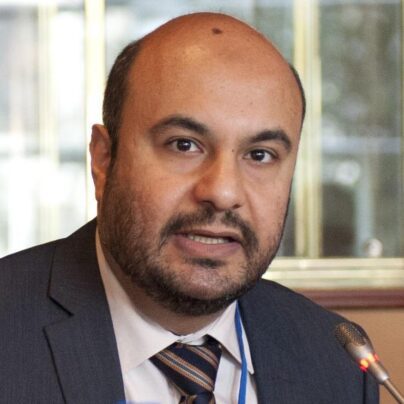Benjamin Netanyahu appeared to be unusually excited on the sidelines of the Likud party conference on 26 December, smiling widely despite the troubles he is facing with politics and the law. The cause of such excitement was a video call, on his personal phone, with someone in a powerful Arab country.
The person on the other end of the call with the Israeli Prime Minister was neither a head of state nor a prominent Arab personality nor, indeed, an important businessman. He was a young man from Riyadh; apparently that controversial man is not only unemployed, but also loathed by the Arab public. He has received many insults on social media due to his shocking behaviour and crude expressions. In short, he is nobody of note.
Last year, the same young man visited Jerusalem and was verbally abused and spat on when he paraded around the occupied city in his national dress. Many refer to him as a foolish person who is emotionally unbalanced. Others believe that he was recruited by officials from Arab countries to play such an appalling “normalisation” role on behalf of them so that they will not jeopardise their own reputations.
His name is Mohammad Saud, a 20 year-old from Saudi Arabia who is popular among Israeli officials because he keeps flattering them and volunteering to serve the aims and objectives of Israel’s propaganda machine. Saud is the ideal model of the Arab man as far as the Israelis are concerned: he states openly that he sympathises with Israel; he expresses a preference to speak in Hebrew; he praises the ruling party in Israel, the Likud; and he declares that he does not care about the Palestinian people’s rights or struggle for justice.
READ: Israel confirms normalisation drive with Arab states
“We love you so much,” he told Netanyahu.
“It is unfortunate that you cannot vote [in the Likud party leadership election] because you will be a wonderful Likud member,” replied the Zionist Prime Minister.
The fact of the matter was that Netanyahu could not find anyone to call in public, apart from a reckless young man, who did not dare to reveal his family name for fear of being a social outcast in his home country. However, Saud seems to enjoy certain privileges offered by the authorities so that he can make similarly provocative public calls under the umbrella of “normalisation” with Israel, to the extent that he has hosted several Israelis in his home. Behaviour like this cannot be sustained at an official level, as officials and public personalities in the Kingdom avoid such situations, which can easily spark indignation among their fellow citizens, Arabs and Muslims in general.
For years, Netanyahu has been bragging about the development of normalisation contacts with some Gulf countries, including visits and forums sponsored by the Trump administration in Washington, as happened last year in Warsaw and Manama.However, public expression of this trend in most Gulf countries remains cautious, as it contradicts the entrenched popular position in the area, and the Arab world in general, which rejects rapprochement with the occupiers of Palestine. As such, the official effort to normalise relations with Israel tends to advance one step and go back again straight afterwards.
Netanyahu and his team realise that his Arab friends tend not to disclose details of their communications with Israeli officials and visits to the occupation state which have taken place. Most normalisation efforts are still secret encounters, in the same way that pleasure seekers meet at night. Thus, leaks about normalisation endeavours are made mostly through the Israeli media and not from the Gulf; this tells us a lot about the dynamics of the situation.
READ: Saudi Arabia’s normalisation with Israel
The case of Mohammad Saud and others, who were largely unknown in their home societies, is not an expression of the progress of normalisation efforts per se. They basically reveal the objective dilemma of normalising relations with the Israeli occupation within a popular sphere, which categorically rejects such moves.
The popular acceptance across the region of the Israeli occupation has not yet been achieved. What is certain is that the Gulf and Arab people reject having friendly contacts with Netanyahu or other politicians, as well as their warmongering generals. This explains why Kuwait, which is distinguished by relatively decent freedom of expression and parliamentary life, is at the forefront of opposition to normalisation.
Benjamin Netanyahu rejoiced while making the video call, and — as usual — he kept bragging about his “many” friends in Saudi Arabia and the Gulf States. However, those who dare to appear in photographs and develop contacts with the Israeli Prime Minister after all these years are very marginal people, with no reputations or popularity to jeopardise.
The views expressed in this article belong to the author and do not necessarily reflect the editorial policy of Middle East Monitor.


![Prime Minister of Israel Benjamin Netanyahu in Athens, Greece on 2 January 2020 [Yiannis Liakos/Anadolu Agency]](https://i0.wp.com/www.middleeastmonitor.com/wp-content/uploads/2020/01/2020_1-03Benjamin-Netanyahu-20200102_2_40130466_50870954.jpg?fit=1200%2C800&ssl=1)

![Saudi blogger Mohammed Saud with Yair Netanyahu, son of Israel’s prime minister [Twitter]](https://i0.wp.com/www.middleeastmonitor.com/wp-content/uploads/2019/08/Saudi-blogger-Saud-with-Yair-Netanyahu-son-of-Israel’s-prime-minister-e1574781857614.jpg?resize=960%2C640&ssl=1)
![Normalisation with Israel -Cartoon [Arabi21News]](https://i0.wp.com/www.middleeastmonitor.com/wp-content/uploads/2019/02/Normalisation-e1550487985834.jpg?resize=719%2C431&ssl=1)








